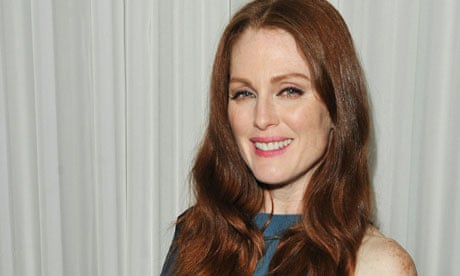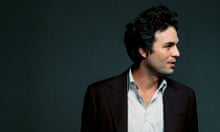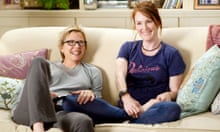In many of Julianne Moore's best films there comes a trademark moment when her eyes squint, mist over, and the mask that her character has been wearing slips decisively. Cue, the great unravelling. It's there in Boogie Nights, when Amber Waves, a porn star with thwarted maternal instincts, gets high and starts shattering on screen, her misty eyes combining with a brittle, metallic laugh that sounds oddly like a death rattle. It's there in Magnolia, when Linda Partridge realises too late that she actually loves the dying husband she married for money, and breaks down in a chemist's: "You have the balls, the indecency to ask me a question about my life," she bellows at the pharmacist, "suck my dick!"
It's there in Safe, in which she plays Carol White, the high-voiced void at the centre of the film, whose immune system can't seem to cope with the chemical composition of modern life. Carol is so repressed that when she peers into the mirror after having a perm, it's not her eyes that tear up. Instead, blood leaks from her nose.
And it's here in our interview too, when Moore's composure breaks and she starts crying in great, heaving gasps that make my hands shoot out nervously towards her. The moment comes as a surprise, because she is – before and afterwards – the absolute model of composure.
We meet in the genteel surroundings of Claridge's, where Moore's De Lempicka beauty fits perfectly – her gorgeous face set off by a strong, elegant profile. She folds her long, slender limbs into one of the highback chairs, and talks easily about her latest film, The Kids Are All Right, a hit at the Sundance film festival earlier this year, which has been picking up praise ever since. It's not surprising. The film follows a lesbian couple, their teenage children, and the sperm donor who rolls into their lives. At the screening I went to, the guffaws at the start were supplanted at its close by a tide of women heading to the Ladies to scrub melted mascara from their cheeks.
Moore's character, Jules, has been with Nic (played by Annette Bening), since university, and on paper this could look like another of her supremely tragic roles. Jules is struggling to cope with her oldest child, Joni, leaving for college and struggling to find direction in her work too. When Paul, the sperm donor she and Nic chose, suddenly enters their life, she starts making some truly disastrous decisions.
Yet, despite this, you never feel that Jules is entirely lost. That's partly because of the comedy – the moment when Nic and Jules try to spice up their waning love life by watching cheesy gay male porn, for instance, the ensuing attempts to explain their use of said porn to their son, Laser, and the occasionally slapstick intensity of Jules's relationship with Paul. But essentially, what stops her being lost is the strength of the family that she and Nic have built, which seems likely, ultimately, to catch her in its arms.
After decades of tragic films about the gay experience, The Kids Are All Right, with its telling title, stresses the universality of family life. "It's a celebration of what family allows you to be," says Moore, "what you can express, how important that love is, how important a long-range relationship is. Oftentimes, in films, it's about meeting somebody and falling in love and getting married, and this is about what it's like in the middle, what you've meant to each other, how you've changed and grown and what you'll continue to be. What does it mean to raise children and watch them leave? It's about sharing that with somebody."
Moore feels strongly about gay rights; she recently starred in an ad for the campaign New Yorkers for Marriage Equality. She's clear that director Lisa Cholodenko didn't set out to make a political film, but says it felt important to have this story up on screen, "because it's a reality. In my life, and in my children's lives too, we have friends where there are two dads, or two moms, and from what I witness around me, there are positive role models for gay families everywhere." She pauses thoughtfully. "You know what else is really nice, is if you're in a same-sex relationship, you can't have a kid by accident, so these children are planned and loved and wanted, well-educated and well-adjusted – and that's what you want. That's what we're all here for, right?" She gurgles an endearing laugh.
Family stories are Moore's favourites. "In a book of Zadie Smith's essays," she says, "she wrote about family being the primary narrative of our lives. And it is. That's the most dramatic, most wonderful, most meaningful place for us all." We start talking a little about her own background, and I ask about her mother, a psychiatric social worker who died last year. I had read that her mother was a feminist, but when I mention this, Moore's eyes immediately squint, tense and tear. "My mom, you know, I'm going to cry, sorry." "I'm so sorry, don't worry," I stutter back, hands raised. She struggles, and continues in a torrent. "My mother died a year and a half ago, and I'm still having a really hard time with it. But she was, you know," she gasps and heaves, "she was married when she was 19, and she had three children really quickly, and she didn't graduate from college until I was in the eighth grade, and then she got two master's degrees, she worked so hard, and she always said, you know, you can do anything you want, and have a career, and . . ." she gasps again and trails off. "Sorry."
It's not surprising she was close to her mother, father and two siblings; her father's job as an army colonel and then military judge took the family to 23 different locations during her childhood, with Moore attending nine different schools along the way. I ask whether she found the moving difficult, and she says she wouldn't recommend it, "but we're all a product of everything we've done, and I'm not unhappy with who I am, and I had a great experience, growing up. Conversely, it's never easy to move, it's not fun to do, it's hard to make friends. But that was the reality of Dad's job."
She has said that she felt like an outsider, and that she was an avid reader. "Most actors have somewhat of an itinerant childhood," she says. "What you learn from moving through different cultures is that behaviour changes, but people are essentially the same, so you learn – how do I behave here, what do I do, what are the rules, how do people dress, how do people talk?"
Her great turning point came when the family moved to Frankfurt, Germany, when she was 16, "and suddenly I had this whole new world in front of me – the UK, France, Italy. The US is a huge country, separated from the rest of the world by these big oceans, and so we tend to get very myopic. To be able to see the world really changed who I was."
It was after appearing in a school production of Tartuffe that a teacher suggested she could have a career in acting; until then, she had never seen a professional play, had considered film-making to be a distant, unreachable world. But the suggestion appealed to her. She studied acting at Boston University, and after leaving, landed a role in US soap As the World Turns, playing good girl Frannie Hughes – and her evil half-sister, Sabrina. "She was her half-sister, and her cousin, which was disgusting!" she hoots. "They had the same father, and mothers who were sisters."
Moore stuck it out for three years, and then, in her late 20s, started to play small roles in films. She quickly became known for pushing the material further than other actors might; in one of her big breakthrough films, Short Cuts, directed by Robert Altman, her character famously argued with her husband while naked from the waist down. It was an attempt to show something honest, true, about the intimacy that exists in marriage – and it worked.
She has had a pretty phenomenal career since then, appearing in around 50 films, including big-budget material such as Hannibal and the Jurassic Park sequel, The Lost World, and movies that have been made on a wisp of a shoestring; she's racked up four Oscar nominations in the process. She has played incestuous mothers and hardcore depressives and dipsomaniac good-time girls. In The Big Lebowski she played Maude, a performance artist with the clipped, tinny tones of Katharine Hepburn, who glides across one scene naked, and in traction, in the service of her "strongly vaginal" work.
Given some of the extreme characters that she's played, is there anything she's ever balked at? "Nothing within the realm of human behaviour," she says simply. The film in which she played an incestuous mother, Savage Grace, was based on a true story, she points out. "When I feel that material is violent for the sake of entertainment, then I'm not so interested in it."
I ask whether there's been a feminist drive behind her career – behind the roles in which she has shown what lies beneath the pose of femininity, and has explored the full range of what women might be, and do. "I'm not of a generation who might have forgotten," she says. "For those of us who were born in the 60s and came of age in the 70s, and remember the women's movement – I mean, my God, birth control wasn't legal in the US until 1965, I think. That's insane! And there are girls today who don't know that. We can talk about glass ceilings, but we have to remember there was a time when there wasn't even a door. I don't take any of it for granted for a minute." She has long been a positive voice for the pro-choice movement in the US.
I ask how she feels about getting older in such a youth-obsessed industry, and what she thinks about cosmetic surgery. "First and foremost, I'm an actor," she says, "and so I don't want to do anything to my face. I can do whatever I want, and I'm still going to be 49 years old, it's not going to change anything." She strokes the tiny crease between her eyes contemplatively. "I don't know that I'm going to look any younger. I'm just going to look like I've had something done to my face."
What she does want is to enjoy family life with her husband, the writer and director, Bart Freundlich, and their two children, Caleb, who's 12, and Liv, who's eight. She seems happily settled in New York, after the comings and goings of her early life, and says that motherhood has enriched her work and made it "bigger, and fuller, and larger. I don't think you really understand as a younger person that your life experience is going to be that meaningful . . . I had no idea that all this experience, and all my interactions, and my parenting, and my marriage, how all that profoundly changes you, how far forward you go emotionally, with all of them."
What she's concentrating on right now, is the practical; getting the work done, and getting the hell out of here. "In terms of choosing material, where having children has changed my life most is that, for instance, I can't go to Europe for four months during the school year. Just like every other working parent I'm trying to figure out: 'How do I work, how am I available for soccer games, how can I make sure that I'm home when everybody's doing their homework?' So if I come to do press in London, I come for two days, and I get right back home." And, with that, she claps her hands happily.




